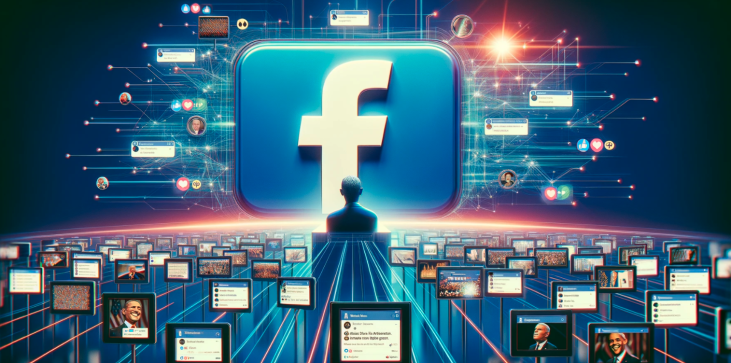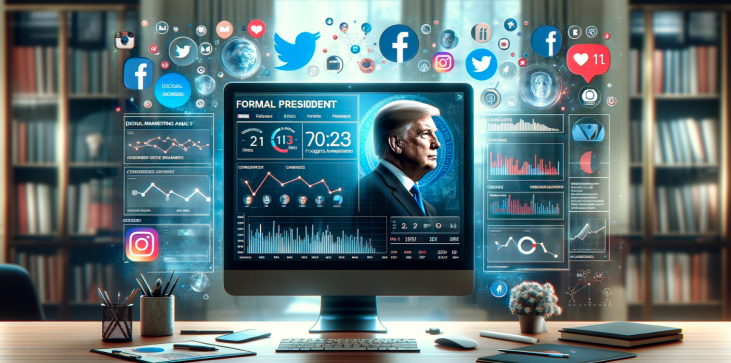
In today's digitized world, social media platforms have become battlegrounds for public opinion, and few have wielded these digital weapons as effectively as Donald Trump. As a public figure, his social media presence, particularly on Facebook, has been a subject of intense scrutiny and analysis. My journey through the labyrinth of his online persona reveals a complex web of strategy, influence, and controversy. When Donald Trump announced his candidacy for the presidency, he already had a substantial following on social media. As a businessman and television personality, he understood the value of direct communication with his audience. Facebook, with its massive user base, presented an ideal stage for his political aspirations. His Facebook account quickly became more than just a platform for sharing personal insights; it transformed into a megaphone that reached millions of people. Each post, share, and like was a testament to his growing influence. The narrative he constructed on Facebook was one of a maverick challenging the status quo, which resonated with a vast audience.
Donald Trump's Facebook strategy was unique in its bare-knuckled approach. By examining the content he shared, I noticed a clear pattern of direct, unfiltered communication. His posts often bypassed traditional media outlets, speaking straight to his base without the intermediary of a news anchor or journalist.
His team understood the algorithmic nature of Facebook and crafted content that was shareable and emotionally resonant. This strategy was not just about spreading messages but also about rallying and energizing his followers. The engagement metrics on his posts were sky-high, indicating a deeply engaged audience.
The strategy also involved rapid response to current events, which kept his page at the forefront of public discourse. By maintaining a constant presence on Facebook, Donald Trump was able to shape the narrative around his campaign and communicate his positions on various issues without delay.
Delving into the specifics of Donald Trump's Facebook page, I noticed several standout features. The page was a blend of promotional content, political messaging, and personal branding. There was a clear focus on visual content, with videos and images dominating the feed.
The content was crafted to be provocative and polarizing, which encouraged comments and shares. Each post was a catalyst for discussion, whether it was a policy announcement or a critique of his opponents. This approach not only amplified his message but also fueled the algorithm that dictated what content users saw in their feeds.
The page also made extensive use of Facebook's advertising platform to target specific demographics with tailored messages. This data-driven approach allowed for precise targeting, which was a cornerstone of the digital strategy employed by his campaign.
While Facebook was a critical component of Donald Trump's digital arsenal, his Twitter account was arguably even more influential. His tweets became notorious for their candid and, at times, controversial nature. They were a direct line from the man himself, unfiltered and unapologetic.
On Twitter, Donald Trump cultivated a persona that was combative and defiant. He used the platform to attack his opponents, defend his positions, and make announcements that would often catch even his own team by surprise. The brevity of Twitter's format suited his communication style, allowing for quick, punchy messages that could easily go viral.
The immediacy of Twitter also played into his hands, as he managed to stay at the center of the news cycle with just a few taps on his phone. His tweets had the power to move markets, influence policy, and shape international relations, showcasing the profound impact of social media on modern governance.
When I juxtapose Donald Trump's Facebook and Twitter strategies, it becomes evident that each platform served a distinct purpose within his broader digital strategy. Facebook allowed for longer, more detailed messages and facilitated a deeper level of engagement with his audience. It was a platform for building and mobilizing a community of supporters.
Twitter, on the other hand, was a tool for real-time communication and reactive commentary. It was the digital equivalent of a public square, where Donald Trump's voice could ring out clearly, often setting the agenda for the day's news.
Despite their differences, both platforms were used to bypass traditional media channels and establish a direct line of communication with the public. The synergy between the two created a formidable online presence that kept Donald Trump in the public eye.

Dissecting Donald Trump's Facebook presence and his broader social media strategy has been an intricate exercise in understanding the intersection of technology, politics, and public opinion. As a digital marketer, I have observed how his use of platforms like Facebook and Twitter has rewritten the playbook for political communication.
The lessons drawn from his approach can inform future campaigns and strategies across various domains. While the criticisms and controversies surrounding his social media activity will continue to provoke debate, the impact of his online presence on his political career is irrefutable.
As we move forward in this digital era, the case of Donald Trump's social media strategy will undoubtedly serve as a blueprint and a cautionary tale for those looking to harness the power of online platforms. Whether in politics or business, the principles of engagement, authenticity, and strategic communication remain as relevant as ever.
During Donald Trump's presidency, his Facebook page employed several effective digital marketing strategies to engage with and grow his audience. Some noteworthy tactics included using provocative language and images, sharing a high volume of content (often multiple times per day), utilizing live video broadcasts, and leveraging user-generated content through reposts and shares. These approaches helped to create a sense of community among supporters and drive engagement on the platform.
Donald Trump's use of Facebook as a campaign tool was unique in that it diverged significantly from more conventional political advertising techniques. Rather than relying solely on professionally produced ads or messaging crafted by consultants, Trump's team embraced a more informal approach, frequently posting unfiltered thoughts and opinions directly to the platform. This strategy allowed them to connect more authentically with their base and build a strong online presence quickly.
Absolutely! By analyzing both the successes and missteps of Donald Trump's Facebook presence, future political campaigns can gain valuable insights into what works and what doesn't when it comes to engaging voters on social media. For example, they might learn that authenticity and responsiveness are key factors in building trust and loyalty among followers. At the same time, they may also recognize the importance of avoiding inflammatory rhetoric or spreading false information, which can damage credibility and erode public support.